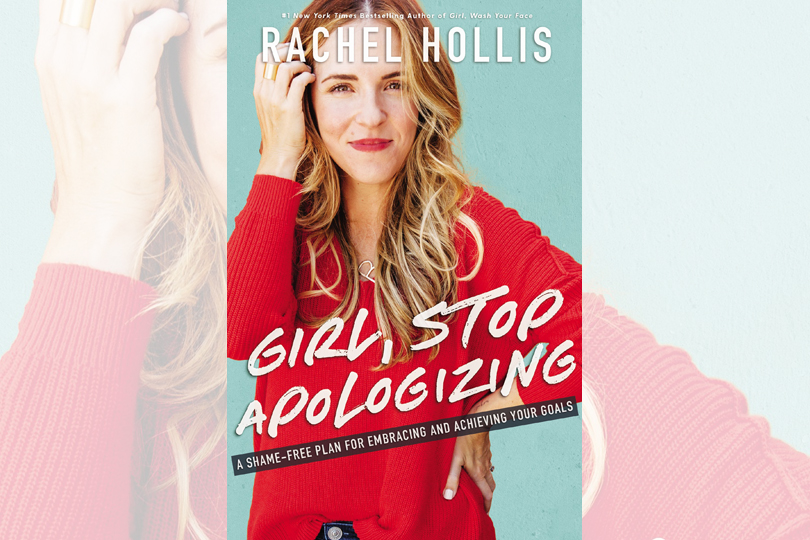If you’ve visited any bookstore over the last couple months or if you follow any #bookstagram accounts, you’ve probably seen Rachel Hollis’s new release: Girl, Stop Apologizing. As I write this, it ranks #7 on the Amazon.ca charts and is listed as the #2 title in the “Women in Business” category. With all the hype, and after the success of her last book, I couldn’t help but be curious: who is Rachel Hollis?
The proud working mama of four runs a popular lifestyle platform called The Chic Site, her own global motivational speaking company, and is a podcaster and author. She was named as one of Inc. Magazine’s “30 Entrepreneurs under 30” and her girl-next-door style, approachable attitude, and bubbly excitement is infectious. I got the chance to speak to her from her office in Austin, Texas, and asked her all about her new book, her tips on how to stop apologizing and reach for our goals, and why she hates the phrase “fake it till you make it.”
Congrats on your new book release! Would you be able to tell us in a nutshell what it’s all about?
The book I released last year, Girl, Wash Your Face, was all about why women should take ownership of their lives, why they should stop believing in these lies that hold them back. So many women read that and were like: “Okay, I’m in, but how? What am I supposed to do? How do I make steps to change?” So, Girl, Stop Apologizing is my how-to guide. Literally. Everything that I could think of about how I have achieved personal or professional success—I wrote it all down. As I was writing it, I realized it wasn’t enough to just tell women that these are the steps you take, cause for so many women, there’s a lot of guilt and shame wrapped up in pursuing something for ourselves if we don’t have the support of those around us. So, I wanted to talk about how to let go of other people’s expectations and really live for who you are.
So, who would you say this book is written for?
I mean, honestly, I do have men in my audience, but it’s really written for women. It’s written for women who are ready and want something. My favourite line in our community is “you were made for more.” What I love about the word “more” is that your definition of “more” is different from mine. So, maybe for one of your readers “more” means to be the best stay-at-home mom the world has ever known. And for someone else, she wants to be CEO. And someone else wants to graduate college. And someone else wants to build a business. But the idea is that only you get to decide what a “more” beautiful, bold, and courageous life looks like.
Why do you think apologizing for our goals and what we want is something that women are prone to particularly?
I mean, truthfully, I think that from the time we’re little girls, we’re raised to please others. I wish this wasn’t the case, but I think that in most cultures, little boys and little girls are raised differently. I definitely was raised in a community where I was supposed to be pretty, I was supposed to be smart, I was supposed to be well-behaved, I wanted to impress mom and dad and their friends, and it turned me into an adult who felt like my value was wrapped up in other people’s perceptions of me. I think that so often, women are defined by who they are for other people: wife, mom, sister, friend. So, then your value is: does someone else think I’m doing a good job in this role? Which is so dangerous because if you’re in a community with people who aren’t loving and supportive of you, then you believe that there is something inherently wrong with you rather than that there is something twisted about how your relationship is showing up.
Yeah, definitely. So, what would you say your top tips for setting realistic goals and achieving them are?
I’m not a realistic goal kind of girl—at least by other people’s standards. I think something that is different for me and how I’ve approached anything I’ve taken on—like my marriage, how I am as a mom, how I’ve built my business—is that my goals are pretty lofty. They’re audacious. They’re big. But I don’t put any kind of time limit on them. I think that if you put a time limit—like if you say “this is what I’m going to achieve this year”—then you’ve got to set some realistic goals. But if you say: “this is what I want to do in a decade”? Well gosh, in a decade most of us could do almost anything with our lives. So, I think that it’s about—truthfully, I think it’s about whatever the goal is for you. Whether it’s big, whether it’s little, that you set the goal and figure out the steps to get there. Said another way: the goal doesn’t have to be realistic, but the roadmap to achieve it does.
What were some of the excuses that you found yourself clinging to for not achieving your goals or not trying to achieve your goals?
A big one for me in business was: I’m not smart enough. I never said that out loud, I probably would have been ashamed to tell other people that, but I have a high school diploma. I found myself really in love with the entrepreneurial journey and for so long, I was like man, if you have enough grit, if you have enough drive, you can make anything happen. Then my business started to grow to a place where we were making more money—I grew up poor. I’ll just say it. So when I started to get to a place in my business where I was making hundreds of thousands of dollars a year (the business was, not me personally) it was overwhelming because I felt like I had surpassed what I was capable of managing because of the lie I told myself, or the excuse that I was clinging to: the idea that I was not smart enough to take it to the next level.
The other excuse I would say, in my personal life, that I really struggled with, is that I couldn’t build a business or be an author or speaker and also be a good mom and wife. I think that is a lie and something I let really give me shame—so much mommy guilt—for years. I think it was honestly that I didn’t see examples of that. I didn’t know anyone who had a career at this level who was as dedicated and focused on showing up well for their family. Honestly, I think it is possible to live any kind of lives that we set our mind to as long as we’re intentional about it.
So, those are the two pieces that made me feel like I was drowning for years. And when I was able to step back and have this self-awareness to understand what I was telling myself and how untrue it was, that was when everything really started to change for me.
Yeah, I think that’s really relatable. You also discuss a few behaviours that women should adopt in your book. Which of them do you think is the most challenging and why is it important?
I think I’m going to go with: stop asking for permission. I think this is along the same lines as apologizing. I did it for years. I was raised in a very traditional home, so when we got married, I would ask [my husband’s] permission to do anything. And he wasn’t even asking me to, and I think he thought I was a weirdo. But I would be like: “Hey, I’m going to go to the grocery store. Do you mind?” I was almost like a little kid asking a parent, because that was just all I knew. Those little things then manifested into big things.
When I did decide to pursue my career and grow my business, and he didn’t like it? Well, now suddenly I don’t have his permission, and this is something so many women tell me at book signings around the world that they are struggling with. They have these goals and dreams in their heart, and they have a partner that is not supportive, so they feel like they need to stop. What I would love to encourage women in this idea that just because it makes them uncomfortable, doesn’t mean it’s wrong. I think that it’s about loving yourself enough to keep showing up for the things that you want and doing things even if other people don’t agree with them.

Now that you wear so many different hats—from running your lifestyle site to being a podcaster, motivational speaker, author, businesswoman, mom, etc.—how do you stay organized? Do you have a few organizational tools or tricks that you use to keep yourself organized?
Everyone I know is die-hard crazy about their morning routine. Like really crazy about their morning routine. Because there is something about if you are so intentional about how you start the day, then you live out that day the way that you want to. And if you live out a day the way you want to, you can live out a week the way you want to. And if you can live a week, then a month, a year, the whole thing. So, I’m pretty crazy about my morning routine. It starts with the idea of setting your intentions in the beginning of the day and focusing on what do you want to accomplish today, not what is your to-do list. A lot of women come to me about feeling like they aren’t productive enough or they feel like they’re wasting time and none of us have a bunch of time to go around. So, I always encourage everybody to start with what do you actually need to achieve. Not what do you need to do. So what are the results that you need to get to today and by focussing on the results and building your calendar around the results that you need, you are so much more likely to make traction in the areas of your life that you are working on.
I think you once said that the old saying “fake it till you make it isn’t true.” Why do you think that?
Yeah, I hate that saying. We learn when we’re young and in middle school and we see the popular girls and they have a certain kind of hair or jeans and we think we’ve got to be like that girl to be liked and accepted. That’s when we start learning to fake it. And all that happens when you fake it—especially in business, when you pretend that everything is fine and your life is great, you alienate yourself from the community of people that can lift you up and help you. So, I just hate that because I think it’s teaching women to suffer in silence. I think it’s teaching them to not ask for help, because they believe that they have to pretend that everything is fine. And it’s okay to be vulnerable. It’s okay to ask for help. It’s okay to raise your hand. It’s okay to say you don’t know. In fact, in business, if I had gotten out of my own way and not believed that saying, then I would be so much further along right now, because I would have had the self-awareness to know what the areas I was struggling with were and I would have gotten help instead of pretending I knew it all and going years and years making stupid decisions because I didn’t know any better.
How would you describe your leadership style and how do you hope your team views you?
I think the people that get the best results are the people that are motivating the community around them and their team, not who are bullying their team. I always want to counsel and guide and coach. That means that I’m going to have to be candid and that means I’m going to have to be honest and that means I’m going to have to tell people when it’s not working and it’s not going right, which is the hardest thing I’ve ever had to learn in my career. Ever. How to be willing to sit with someone and be confrontational and how to be better—like how to coach is hard, because I’m a people pleaser, remember? I never want to hurt anyone’s feelings. But all that happens as a leader when you’re not honest with people and you don’t tell them how they’re missing the mark is that you don’t give them a chance to succeed. You’re actually hurting your team when you’re not honest with your team. So, we really try to breed a culture of being candid and truthful. And you don’t say anything about anyone that you wouldn’t say to their face because that’s what makes us go faster and stronger, because we are engaged in those conversations, not into a year in review but every single day.
You’ve made a career that involves you being really visible in the online world. I was wondering if you have any advice for women who get sucked into the whole Instagram vortex of comparisons.
Oh, yes! Gosh, so many things. Comparison is the death of joy. The second that you start to compare yourself to other people, other women, other lives, you take all of your steam, motivation, and power and you give it away to your projection of someone else. First, we forget that people are showing their highlight-reel. I think it’s that self-awareness of what’s really going on, number one.
Number two: if you are looking at social media and it’s not making you feel happy, making you giggle, it’s not uplifting you, stop consuming social media. The easiest thing to do is to edit your feed. Stop consuming people who when you see their pictures make you go “oh, my body’s not right, my hair isn’t pretty…” Unless something makes you feel good, why on earth would you put it into your mind and your heart?
And then one step further from that is if that’s not enough: stop going on. Be really mindful and remind yourself that there is no law that says you have to look at Instagram.
What advice do you have for aspiring authors?
Honestly, you just have to write the freaking book. You just have to write the words. It sucks, it’s hard, it’s a slog. I’m writing my ninth book. It never, ever gets easier. Because if it was easy, then everyone would be an author. So, I think for anything we want to do, for any goal we want to achieve, you have to remember that it’s going to be tough.
So, what’s next for you?
Wow! So probably the biggest: we have a women’s conference that we do every year, and we have 11,000 women coming this summer, which is so exciting. In Canada, I get to be onstage with my hero this year, which is so exciting. I got invited to open for Tony Robbins so I’m in I think Calgary in August and Toronto in October. Writing my next book which comes out in 2021 and there are other things. Man, we’re doing all the things!












